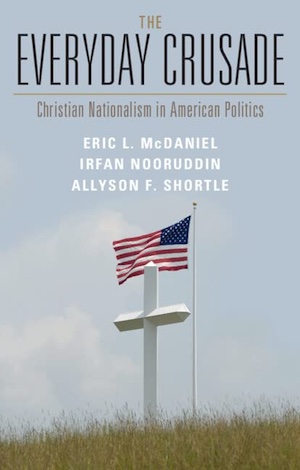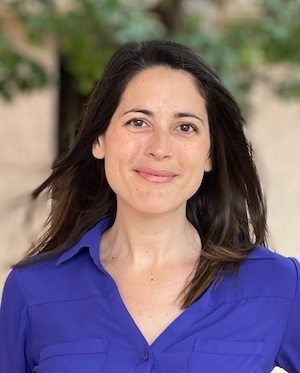By Beks Freeman
Allyson F. Shortle, an associate professor of political science at the University of Oklahoma, graduated from Union College summa cum laude, Phi Beta Kappa, and Union Scholar. Her book The Everyday Crusade: Christian Nationalism in American Politics, co-authored with Eric McDaniel and Irfan Nooruddin, was published by Cambridge University in 2022. She recently spoke at Union College about the book and the work that underpins it.
“In The Everyday Crusade, an impressive group of scholars combines their individual expertise to conduct a strikingly thorough exploration of religious exceptionalism,” wrote Nicole Yadon, assistant professor of Political Science at Ohio State University. “Not only do they draw evidence from numerous surveys over the course of a decade, but they also examine how religious exceptionalism manifests across groups and even in global contexts.”
According to reviewer Davin L. Phoenix, associate professor of Political Science at University of California, Irvine, The Everyday Crusade “illuminates the longstanding hold of American religious exceptionalism on policy preferences, political beliefs, and American identity.”

Terry Weiner, Chauncy H. Winters Professor of Comparative Social Analysis Emeritus in Union’s Political Science Department, was Shortle’s senior thesis advisor. He recalled, “Allyson was a regular in my office — a serious student with a wonderful sense of humor. She always had a curious mind and wanted to discuss issues related to the role of women, minorities and the disadvantaged. Her later work reflects these interests as she explores the role of the rise of Christian Nationalism in our society and its impact on the political system. Allyson was a student you looked forward to seeing each week.”
Shortle noted that her liberal arts background “has a tremendous impact on how I approach my research.” Her undergrad at Union gave her an appreciation for diverse disciplines, including history, psychology, sociology, economics, and statistics — disciplines she consistently draws on for insights in her research. “I also like to think it has made me a more well-rounded and approachable person — a crucial skill for anyone who listens to people’s opinions for a living, and for maintaining a happy and fulfilling life,” she said.
Ethnocultural nationalism (EN), also called ascriptive nationalism, is “one of the multiple traditions of American identity attachments, widely held norms/beliefs about who counts as a true American,” Shortle explained. “Ethnocultural nationalists believe that in order to be a true American, one should share certain ascriptive traits — i.e., being white, Christian, and having European ancestors.” EN is considered a more exclusionary tradition of American identity. It is opposed to civic nationalism, “which posits one should simply believe in liberal democratic ideals to be considered a true American,” she said.
Shortle was introduced to EN during her Ph.D. studies at Ohio State, where she was initially examining the link between nationalism and immigration attitudes, she explained. Her work with McDaniel and Nooruddin on Christian nationalism (a type of EN) started with work on academic articles before evolving into what would become The Everyday Crusade. The process for the book spanned more than eleven years, with much of the initial data collection taking place from 2011 to 2014. “After collecting data from several different sources over the course of several years, we realized the Christian nationalism effects were incredibly robust,” Shortle said. “At that point, we were convinced that this was a massively important ideology influencing public opinion in American politics.” Shortle drafted a prospectus, which they used to pitch their book idea to Cambridge at a political science conference in 2015. Cambridge was enthusiastic in their support, so they collected more data from 2015 to 2020 (the book includes nine surveys across three presidential administrations). Cambridge gave the green light for publication in 2020, and after a review period, the book was published in 2022.
Shortle has written numerous articles, both on her own and with co-authors, for journals such as American Politics Research, Political Behavior, and the Journal of Race, Ethnicity, and Politics. She explained some of the differences between solo and co-authoring, and which she prefers. “Co-authoring requires more time management skills, scheduling deadlines, meetings, and getting everyone on the same page,” she said. “Writing on your own offers more flexibility since you do not have meetings with co-authors, but it also means you have to be your own accountability manager.” Shortle prefers the collaborative setting that allows each person to take tasks that line up with their strengths because effective delegation results in a better end product. “Also, it’s more fun to write with your friends,” she added.
That collaborative environment might alleviate some of the less glamorous parts of writing an article or book: wrapping it up. “I find revising my own work to be downright painful some days,” Shortle observed. “After I think I have answered a big puzzle, the last thing I want to do is to read over my manuscript for the eighteenth time to eliminate every instance of passive voice. And yet, it is arguably the most important part of the process. Editors are saints.”
Shortle will continue her collaborative work with Ana Bracic and Mackenzie Israel-Trummel on a new book. This project will delve further into how other forms of EN might influence the increasingly alt-right and antidemocratic attitudes and behaviors in the U.S., and take that into studying global politics. She said, “Our book will address a big question in political science, which is: How do nations decide who belongs?”
Shortle underscores that however tedious it can feel, attention to detail is worth the work. She enjoys much of the research process, but her favorite parts are related to understanding communities and their needs. “As a public opinion scholar, I often am able to watch people’s responses come back in real time,” she said. “It can feel exhilarating, because you’ve put so much work into designing a well-constructed research project to answer one question — in my case, it’s always a question about what shapes people’s attitudes or behaviors. These responses help you solve a puzzle, but they also allow you to hear from real people with real opinions.”
So the next time you are asked to fill out a survey, it is nice to remember that there is a real person with real questions on the other side of it, someone who cares about your opinion. “It really lets you see the humanity behind the science of it all,” Shortle said. “People’s responses aren’t just statistics. Most people really care about some issues, and in this one moment in time, I get to be the person who hears them at a time when many of these people do not feel heard. I think that’s pretty great.”
Beks Freeman (they/he) is a senior at Purdue University double majoring in acting and creative writing. They were inducted into Phi Beta Kappa there in April 2022. Purdue University is home to the Zeta of Indiana chapter of Phi Beta Kappa. In addition to their undergraduate studies, Freeman is pursuing acting, teaching, and fight directing certifications in stage combat with Dueling Arts International.




